Unit20Humour课件大纲人教版课件.ppt
- 格式:ppt
- 大小:1.77 MB
- 文档页数:58
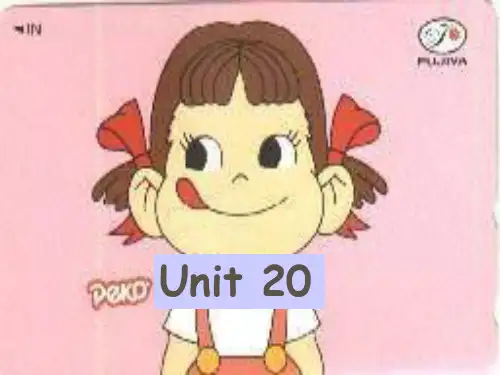
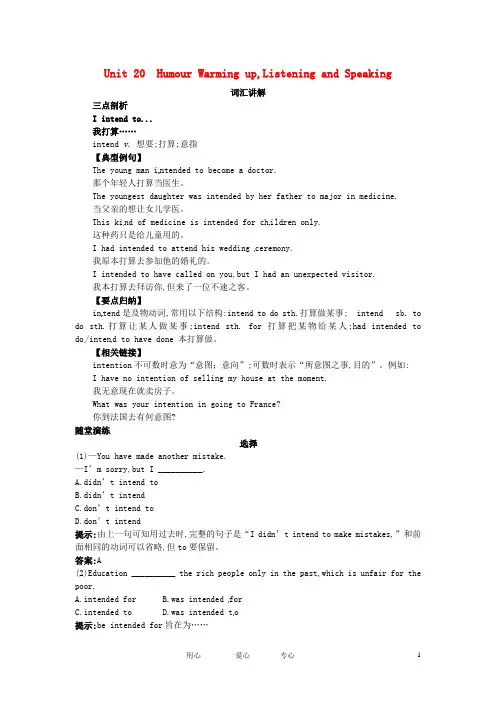
Unit 20 Humour Warming up,Listening and Speaking词汇讲解三点剖析I intend to...我打算……intend v.想要;打算;意指【典型例句】The young man i ntended to become a doctor.那个年轻人打算当医生。
The youngest daughter was intended by her father to major in medicine.当父亲的想让女儿学医。
This ki nd of medicine is intended for ch ildren only.这种药只是给儿童用的。
I had intended to attend his wedding ceremony.我原本打算去参加他的婚礼的。
I intended to have called on you,but I had an unexpected visitor.我本打算去拜访你,但来了一位不速之客。
【要点归纳】in tend是及物动词,常用以下结构:intend to do sth.打算做某事;intend sb. to do sth.打算让某人做某事;intend sth. for 打算把某物给某人;had intended to do/inten d to have done 本打算做。
【相关链接】intention不可数时意为“意图;意向”;可数时表示“所意图之事,目的”。
例如:I have no intention of selling my house at the moment.我无意现在就卖房子。
What was your intention in going to France?你到法国去有何意图?随堂演练选择(1)—You have made another mistake.—I’m sorry,but I __________.A.didn’t intend toB.didn’t intendC.don’t intend toD.don’t intend提示:由上一句可知用过去时,完整的句子是“I didn’t intend to make mistakes,”和前面相同的动词可以省略,但to要保留。
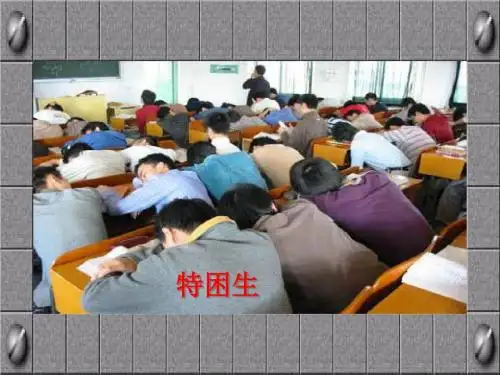
![高中英语Unit 20 Humour--warming up [ty]课件旧人教第一册下](https://uimg.taocdn.com/07ffa5dd941ea76e58fa042e.webp)
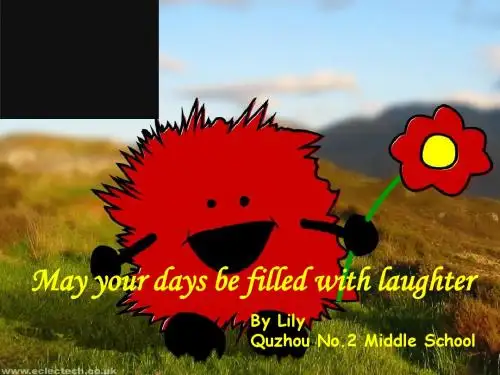
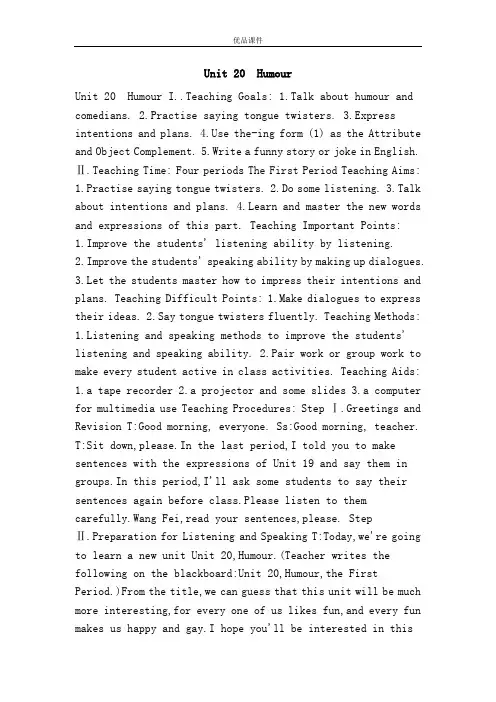
Unit 20 HumourUnit 20 Humour I..Teaching Goals: 1.Talk about humour and comedians. 2.Practise saying tongue twisters. 3.Express intentions and plans. e the-ing form (1) as the Attribute and Object Complement. 5.Write a funny story or joke in English. Ⅱ.Teaching Time: Four periods The First Period Teaching Aims: 1.Practise saying tongue twisters. 2.Do some listening. 3.Talk about intentions and plans. 4.Learn and master the new words and expressions of this part. Teaching Important Points:1.Improve the students' listening ability by listening.2.Improve the students' speaking ability by making up dialogues.3.Let the students master how to impress their intentions and plans. Teaching Difficult Points: 1.Make dialogues to express their ideas. 2.Say tongue twisters fluently. Teaching Methods: 1.Listening and speaking methods to improve the students' listening and speaking ability. 2.Pair work or group work to make every student active in class activities. Teaching Aids: 1.a tape recorder 2.a projector and some slides 3.a computer for multimedia use Teaching Procedures: Step Ⅰ.Greetings and Revision T:Good morning, everyone. Ss:Good morning, teacher. T:Sit down,please.In the last period,I told you to make sentences with the expressions of Unit 19 and say them in groups.In this period,I'll ask some students to say their sentences again before class.Please listen to them carefully.Wang Fei,read your sentences,please. StepⅡ.Preparation for Listening and Speaking T:Today,we're going to learn a new unit Unit 20,Humour.(Teacher writes the following on the blackboard:Unit 20,Humour,the First Period.)From the title,we can guess that this unit will be much more interesting,for every one of us likes fun,and every fun makes us happy and gay.I hope you'll be interested in thisunit.First,let's learn the new words and expressions of this period.Look at the screen. T:Look at the firstword:twister.Read after me:“twister”.(Read it twice),tongue twister….Do you know tongue twister?It means“a word or phrase difficult to speak quickly or corr ectly”.such as in Chinese“吃葡萄,吐葡萄皮,不吃葡萄,不吐葡萄皮”.In English,there are many twisters,too.In a while,let's read them.… (Teacher gives brief explanations to other words if necessary.) Step Ⅲ.Warming up T:Please open your books and turn to Page 39.Look at Warming up.Let's practise saying the following tongue twisters.First,read it slowly.Then read them faster and faster.You can read them to your partner.And let your partner see if there is any mistake in your reading.At last,I'll ask five students to read them before class to see who can speak faster without making mistakes,OK?let's begin. StepⅣ.Listening T:So much for warming up.Now we'll do listening.In the next period of time you will hear an interesting story.It is about a couple who got married.A child is asking her grandmother about her marriage.Number the pictures in the proper order.The first one has been done to help you.Please read the other two requirements to see what you will have to do after you finish listening.(After a few minutes.)Do you know about the things you'll do?(Ss:Yes.)During the period when you listen to the tape,I'll play it three times in all.When I play it for the first time,just listen.When I play it for the second time,do the exercises and you can check your answers to make sure they are right when I play the tape for the third time.Then check your answers with your classmates and tell your partner the story.Note that the beginning of the story has been given to you on Page 39.(At last,the teacher shows the pictures in the right order and the answers of Part 2 on the screen to get allthe students to check and then asks a student to tell the story to the whole class.) Step Ⅴ.Speaking T:Now let's do speaking.First,please read a dialogue between ajournalist(j)and a comedian(c). T:(After students read the dialogue)What's the most important thing in a comedian's job? SA:The important thing in a comedian's job is not only to make people laugh,but also to get them to think about life. T:How many ways to make people laugh are given?What are they?What other examples can you give? SB:Two ways are given.They are:Jokes about speaking a foreign language and the way someone walks and talks.Other examples are:their make-up, the styles of their clothes,shoes and the way they hear something or see something etc. T:Please make a dialogue yourself.Pair work.One acts as the part of a journalist(j)and your partner acts as a circus clown(c).The dialogue you make should include the questions on Page 40.And you can use the expressions on the screen to help you.(Show the screen.)Later,we'll ask one pair to give us a performance.Let's begin. Useful expressions: I will…I'm going to… I intend to … I hope to… I plan/want to… I wish to… I've decided(not)to… I hope not to… Sample dialogue: J:For which age do you write your show? C:I mainly write my show for children.They're very interested in it.But a lot of adults like my show,too. J:What do you do as a clown? C:To make people laugh:We often don't use any words.It is our clothes,make-up and way we act that make people laugh.People laugh and they forget their problems for at least a moment. J:What are you doing at this moment? C:I'm getting ready for a performance with my partner.It's the funnest I've ever shown. J:What are your plans for your next show? C:I've written several shows.I intend to do them in the next few weeks.I hope to act them during the christmas holiday. J:How do you make childrenlaugh? C:I make them laugh by movements.I copy Charlie Chaplin's movements in my performance.Childern laugh with tears. J:When will you stop working as a clown? C:As long as people especially children like me,I want to go on working until I'm very old.I like my job very much. J:Thank you very much. Step Ⅶ.Summary and Homework T:In this class,we've practised some tongue twisters and listened to a story.Then we've done some speaking practice.Above all,we should remember the useful expressions about how to express intentions and plans.What are they?They are…(The Design of the Writing on the Bb.Teacher and students say them aloud together.)Today's homework:1.Collect as many tongue twisters as possible;2.Make dialogues after class according to the situations given on the screen.(Teacher shows the screen.)That's all for this class.Class is over. Situation 1:This weekend you intend to see a film/watch a football match/visit a friend or some relatives.Or you plan to go shopping/go fishing/go sightseeing/go mountain-climbing etc. Situation 2:Suppose you have some special plans for New Year or for the winter holidays.You'd like to talk about it with your friend. The Second Period Teaching Aims: 1.Learn and master the new words and expressions of the text. 2.Learn something about comedy,clown and comedian,especially about crosstalk show. 3.Improve the students' reading ability by reading the text. Teaching Important Points: 1.How to master the new words and expressions of the text. 2.How to improve the students' reading and writing ability. Teaching Difficult Point: How to get the students to grasp the main idea of a passage as soon as possible. Teaching Methods: 1.Fast reading to improve the students' reading ability. 2.Pair work or group work to get every student active in class. 3.Inductive method to make the students understand the text better. Teaching Aids:1.a recorder2.a projector and some slides3.a computer for multimedia use Teaching Procedures: step Ⅰ.Greetings and Revision Greet the whole class as usual.Teacher checks the students' homework. step Ⅱ.Preparation for readingT:Now,please turn to Page 114.Let's learn the new words and expressions together.First read them by yourselves. T:(After the students finish reading.)Who will read the new words and expressions for us? SA:(Standing up)I'll try.(SA begins to read.)(After the student finishes reading teacher points out the students' mistakes in pronunciation and stress if there is any.Then teacher plays the tape-recorder to let the students listen and follow.) T:So much for the new words and expressions.Please turn to Page 40 and read the instructions in Pre-reading.Have a discussion with your partner and make preparations for the questions.(Teacher shows the pictures on the screen.After five minutes.) T:Are you ready?(Ss:Yes,we are ready.)Look at the photos.Do you know who the first comedian is? SB:He is Chaplin and he was born in Britain.He began to act when he was five.When he was seventeen,he went to the United States.During his lifetime,he wrote,acted and directed many films.I read this from a magazine sometime two weeks ago. T:Do you know what makes him funny? SB:His own manner of acting.Even his way of walking down the street,eating and turning a corner is different from other's.I saw several of his films. T:What about the second picture? SC:He is Zhao Benshan and is from Northeast.We often see him act on TV.He is a famous actor and every one of us likes him. T:Do you know examples of other comedians who are funny in the same way? SD:Yes.In our country,Wang Jingyu is a comedian,who is almost in the same way as Charlie Chaplin.I saw several of his programmes.There are many other comedies like Zhao Benshan,such as Pan Changjiangand Chen Peisi.They often appear on the stage or TV.I think comedians not only are actors but also artists.They make our life colourful,make people laugh as well as get all of us educated by their acting. SE:3.Yes.I think comedians play an important role in our ughter and humour are important parts.Just think what our world would be without humourous TV programmes,films etc.That's terrible. Step Ⅲ.Fast Reading T:Quite right.I have the same opinion as you.Let's study hard now and help to make our life full of homour and happiness.Now,please read the text“Laughing matter”fast and then answer the questions on the screen.Write your answers on a piece of paper.I'll collect the first five pieces. (Teacher shows the screen.) Answer the following questions: 1.How do Americans sound funny in a comedy? 2.How can clowns help people?3.What is sketch? (Teacher goes among the students and collects the first five pieces of answers.) T:(After all the students finish.)Who can give us the first answer? Sf:They sound funny speaking with a foreign accent. T:The second question? Sg:They can help people relax and forget their problems for at least a short moment. T:What is sketch? SH:Comedian may act out a situation during their show and we call that a sketch. Step Ⅳ.Reading T:You have done very well.Now please read the text again and discuss the questions in Post reading.Pair work or group work.I'll ask some students to give us their answers in a minute.(Teacher goes among the students and joins in the students' discussion.When all the students finish,teacher says the following.) T:Have you finished?(Ss:Yes.)Who will give us the answers?Volunteers? Sa:1.The text tells us that dating back to the Qin Dynasty,the traditional cross talk shows,or Xiang Sheng shows,have made people all over China roar with laughter for centuries.That's to say,it exists in China for more thantwo thousand four hundred years. Sb:2.When the writers of comedies write in order to make people laugh,they often let cross-dressing men and women appear on the stage or have characters that are stereotypes coming different countries or people doing certain jobs.They also play on words to create fun. Sc:American comedians speak with a foreign accent.Sd:3.Because the words used by the comedies then have the different meaning now,so they can't be understood even by native Englishmen. Se:4.Aclown often appears on the stage alone or with a ually they don't say anything.They make people laugh only by their clothes,make up and the movements of the body.Even they walk,eat and sleep in a different way from a normal person. Sf:5.I think it is more like a comedy than the show of a clown.Because the way they make people laugh is not like the show of a clown,but like the actors in a comedy.They both use word play. Sg:6.They both use the same techniques to make the audiences laugh,such as strange-dressing men or women,characters from different places the words that make people laugh,as well as their strange accents.Though both western and Chinese comedians use the same techniques,the techniques they use are closer to their own people,such as the style of their clothes,the food they eat,the scene in a comedy and so on. T:You've done well.Now let's have some students act how people from different countries walk,talk and behave. (Students act.) T:Now look at the screen.I'll give you some further explanations for some new words and expressions. Notes: a.character:a person in a book,play etc. b.make fun of:to laugh or cause others to laugh rather unkindly. e.g.People make fun of her because she wears such a strange hat. c.play on words:use amusingly a word or phrase that has two meanings,or words having the same sound but different meanings. d.in common:in sharedpossession e.g.The four boys grew up together and have a lot in common. e.applaud:to praise(a play,actor…) especially by striking one's hands together f.appreciate:to understand and enjoy the good qualities of T:Please read the text again and see if you have anything you don't understand.(Teacher goes among the students and answers any questions raised by the students.) Step Ⅴ.Listening and Reading Aloud T:Now let's listen to the tape.I'll play the tape recorder twice.The first time I play it,listen carefully.When I play it for the second time,please listen and follow it.Then you read it aloud.Are you clear? Step Ⅵ.Summary and Homework T:Look at the screen.The four topics are all discussed in the text.Read the text again and find the paragraph or paragraphs each topic includes.Then give some detailed information about them.Pair work or group work.In a few minutes,we'll check the answers. Complete the following: TtThe Third Period Teaching Aims: 1.Learnthe“-ing”form used as the Attribute and Object Complement.2.Learn about word formation.3.Improve the students' ability to make sentences and write. Teaching Important Point: How to get the students to master the“-ing”form. Teaching Difficult Point: The difference between the“-ing”form used as the Attribute and Object Complement. Teaching Methods:1.Discussion to make every student have a clear understanding.2.Explanation to make every student have a clear concept.3.Pair work or group work to make every student active. Teaching Aids: 1.a projector and some slides 2.a computer for multimedia use Teaching Procedures: step Ⅰ.Greetings and Revision Greet the whole class as usual. Teacher checks the students' homework. step Ⅱ.Word Study T:Now let's do Word Study.Read these sentences and find words of the same root from this unit.Then translate the sentences into Chinese.Do you know what“thewords of the same root”means?For example,we have learned the words:nation n.;national adj.;nationality n.And we can say that the three words have the same root,because each of them has the wor d root“nation”.Are you clear aboutthis?(Ss:Yes.)OK,have a discussion with yourter,I'll have some students give us the answers. T:(After a few minutes.)Are you ready? Ss:Yes.We are ready. T:Now please give us your answers.One student,one sentence. SA:Sentence 1.当喜剧演员讲笑话时,人们从他说话的声音中就能感觉到他的辛酸。

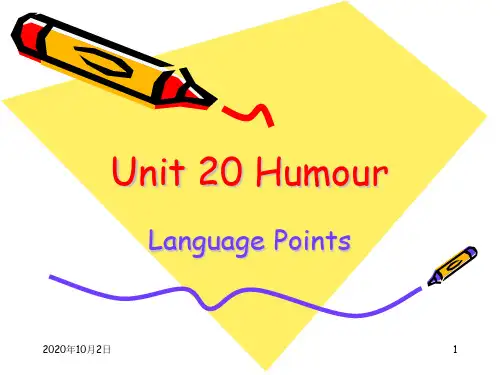
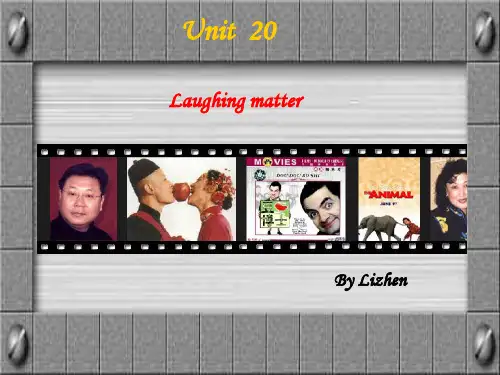
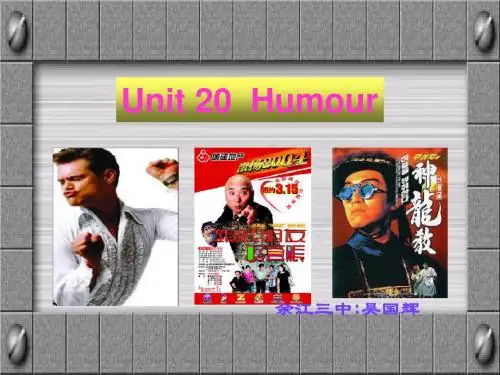
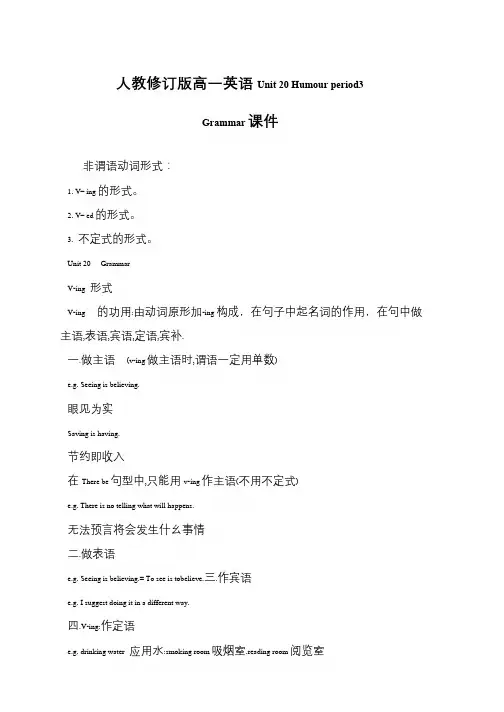
人教修订版高一英语Unit 20 Humour period3
Grammar 课件
非谓语动词形式:
1. V– ing 的形式。
2. V– ed 的形式。
3. 不定式的形式。
Unit 20 Grammar
V-ing 形式
V-ing 的功用:由动词原形加-ing 构成,在句子中起名词的作用,在句中做主语,表语,宾语,定语,宾补.
一.做主语(v-ing 做主语时,谓语一定用单数)
e.g. Seeing is believing.
眼见为实
Saving is having.
节约即收入
在There be 句型中,只能用v-ing 作主语(不用不定式)
e.g. There is no telling what will happens.
无法预言将会发生什幺事情
二.做表语
e.g. Seeing is believing.= To see is tobelieve.三.作宾语
e.g. I suggest doing it in a different way.
四.V-ing:作定语
e.g. drinking water 应用水:smoking room 吸烟室.reading room 阅览室。